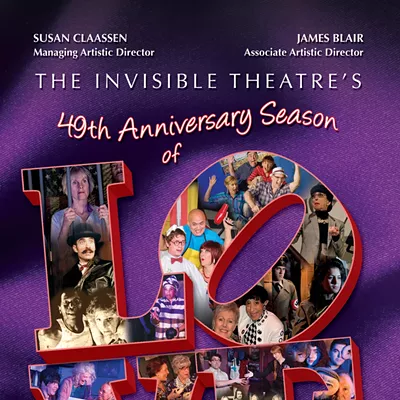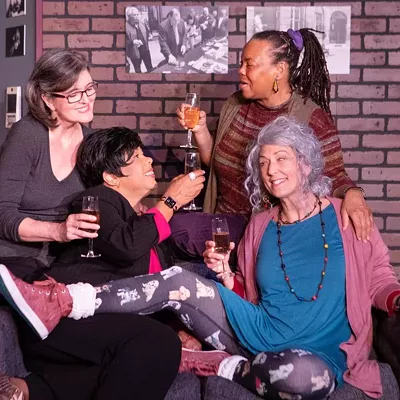Sister Sledge provides the exit music as you leave the Invisible Theatre after enjoying its current little romp, Miracle on South Division Street.
And "We Are Family" is an absolutely appropriate and upbeat choice by director Gail Fitzhugh (who also designed the sound), because the story we have just witnessed delivers an upbeat conclusion to one family's crisis of faith as it deals with shocks that shake its foundations.
But this is not a Eugene O'Neill or Sam Shepard or even an A. R. Gurny version of family woes. Playwright Tom Dudzick unfolds the story of the Nowak family with a very light touch. The result is a good-natured piece that has us laughing from start to finish at a wonderfully contrived setup and characters who are not so very different from people we know and love.
It's set in a run-down neighborhood in east Buffalo, N.Y., where urban decay and an exodus of denizens who long for a more upscale life have left it a shadow of its former self. It's very much like the neighborhood Dudzick himself grew up in, and his Polish Catholic, blue-collar background has been fodder for a number of plays, including a trilogy about a family living over a tavern (as did Dudzick's family.) This show is a great choice for IT because of its small cast and single set, and it's a perfect show for the season. It's not overtly holiday-ish, but there's not a mean bone in its body, and its light tone and sweet story offer a funny, feel-good experience.
The Nowaks have lived on the eastside since World War II, and though families have fled and shops have closed, the Nowaks are firmly rooted there. The matriarch is Clara (Toni Press-Coffman) a plain-spoken, uncomplicated woman who has raised three children, one of whom, Ruth (Carly Elizabeth Preston), has called a family meeting. Ruth hopes to be an actress, an aspiration Clara doesn't understand or approve of, especially since Ruth attended a recent production of The Vagina Monologues, a title that Clara can't even bring herself to say.
Jimmy (Seth Fowler), a trash collector, wishes Mom would move out of the neighborhood. He seems to be an agreeably sweet son, although it is revealed that he has been dating a Jewish woman he met at the bowling alley. He wants to marry her, although he knows Mom is not going to go for that at all. Bev (Alida Holguin Gunn) blows in late, a vision in a powder-blue track suit bedazzled with rhinestones, eyes also shimmering with a hefty dose of makeup. A ketchup bottler by trade, she's on her way to the bowling alley, and is quite impatient to get the meeting done with.
The chief thing that keeps Clara tied to the neighborhood is a 20-foot-tall statue of the Virgin Mary that stands in the front yard. Her father had it built in 1943 because, according to him, the Blessed Virgin had appeared in a vision at his barbershop. Although there was no official sanction of this "miracle," family members no doubts that it is real and have tended to the statue through the years, explaining to passers-by its significance, and feeling that they had been especially blessed. Clara has now turned the barber shop into a soup kitchen, and doles out dishes that some claim have mysterious healing powers. "Prepared on holy ground" is as catchy a slogan as "Mmm-mm-good," a neighbor has declared.
Ruth has called the meeting to speak of her plans of making the story of the shrine into a one-woman show. She asks for family members' permission, and they think it's a great idea. But, Ruth declares, it would be the true story. Whaaat?
Ruth says that her grandmother, Clara's mother, had confessed to her on her deathbed that there was an entirely different story behind the shrine. As the group talks, layer after layer of the family mythology is peeled back, causing layer upon layer of disbelief, shock, and impossible truths to blanket the group, particularly poor Clara.
Dudzick has skillfully constructed his tale, and each revelation is ever more disturbing to Clara. The truth pummels her, requiring her to make huge adjustments to who she believes herself to be. And as Dudzick gives the Nowaks a lot to chew on, he gives us lots of laughs.
The small cast does a solid job, with Press-Coffman's Clara designed to deliver most of the punch lines. She creates a feisty and resilient character, though maybe her responses don't build in quite the proportion of the crescendo of the ever-more outrageous revelations. The other characters are developed credibly enough by the ensemble, but, apart from Bev—who blows tornadolike into the scene—they are pretty tame creations.
Designers James Blair and Susan Claassen have managed to put an entire kitchen, and then some, on the theater's small stage. The room, which might have been fashionable in the '70s , complete with working Crock-Pots and copper Jello molds, is wonderfully evocative of the sturdy room that we can believe has held so many such family meetings.
Costumer Maryann Trombino gives us a Clara who is quite the vision of a no-nonsense housekeeping mom. Her over-the-top get-up for Bev really helps give us a sense of the character.
The short play has two scenes, with the first holding the meat of the story. There's a second, much shorter scene, which seems rather tacked on, to end the piece. It feels gratuitous with its revelation about Ruth's character and really rather unnecessary.
But for the most part, Miracle on South Division Street gives us a spirited and very funny story. The IT gang does a fine job, and chances are this will be a hot ticket this season. Nab yours soon.








